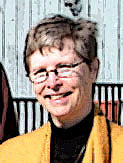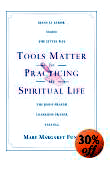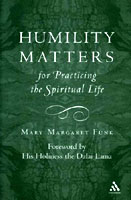 |
|
She was the Executive Director of MID Board. She collaborated with James Wiseman, editor, on the last 30 issues of Monastic Interreligious Dialogue Bulletin and Web Site: MonasticDialog.com Published
Thoughts Matter in 1998 by Continuum. It’s a teaching on
the 8 afflictions from John Cassian. A second book, Tools Matter
(2001)
on practices that help us with our afflictive thoughts and help us
to lift up our thoughts in prayer. She has chapters in Benedict’s
Dharma (Riverhead, 2001) and Purity of Heart (Continuum 2001).
Book
on Gethsemani Encounter II, Transforming Suffering (Doubleday 2003).
Published, Islam Is… (Lantern 2003) is her third book. "Humility
Matters" for Practicing the Spiritual Life (Continuum 2005).This
is the third volume of a trilogy that began with Thoughts Matter. Sister
Mary Margaret Funk
"And now Islam is with us in the United States and throughout
the West — a jewel in our midst. It is a religion that brings
each generation to a God-consciousness that fosters all that is human.
Whether we are lay or religious, Christian or Muslim, we cannot afford
to delegate this dialogue to specialists, academics, political and
military generals. We must bow our heads and bend our knees and,
upon rising, extend our hands. We are friends." Sufism, the Way of Love "I feel I have an affinity with Sufi devotees. Their practices
have heightened God-consciousness and have inspired some of the greatest
religious poetry and music ever written. When I am with Sufis and
participate in the prayer to our same God, I feel their intensity.
Some of that intensity's exuberance seems more like the Christian
charismatic movements than the low-key, everyday chant of the monastic
choir. Nevertheless, the sober phases of Sufism seem like a great
'fit' with my own love for Our Lord, Jesus Christ — through
our daily inner conversations. Sufism is a way of love." Vanity "The most telling indication that we are in the grip of vainglory is revealed in daydreams, excessive imagining of situations where we are the center of attention. Through the practice of watchfulness, we need to stay in the present moment, noticing subtle signs of boasting, of being competitive, of telling remarkable tales about ourselves, of seeking and taking credit, of playing the role of the hero. "We must continually edit, redirect, and change
thoughts about ourselves that are either high (praise) or low (dejection).
The practice
of humility is to think about myself exactly as I am. Vainglory intoxicates
the mind." Humility Matters "Humility matters. It is at the core of our
experience of life in Christ. So central is this quality of being
that it may be said
that humility is for a Christian what enlightenment is for a Buddhist,
realization is for a Hindu, sincerity is for a Confucian, righteousness
is for a Jew, surrender is for a Muslim and annihilation is for a
Sufi. Humility is what others see of our purity of heart." Guard of the Heart "When we guard our heart, we refrain from being in contact with energies that will interfere with our effort to pray ceaselessly and eventually with our experience of God's presence. We cannot engage in ceaseless prayer and simultaneously engage in afflictive thoughts and emotions. So, guard of the heart prevents easy entry of any disturbance into our heart. It requires us to take control of what goes in and what the heart has to 'feel.' "Guard of the heart is a practice that is most
helpful once we've made a resolution about something. When we want
strongly to
follow through with our resolution we should guard our heart from
doubt and from counter experiences that move us away from our resolve.
The fruit of guard of the heart is a heart full of strength and commitment
to our vocation, our work, and our relationships. Since the heart
provides us our innermost experience of 'being with' God, we should
guard all our choices to 'be with' God." Rooting Out Anger from Our Hearts "The thought of 'about anger' rises in each
one of us. Anger is a response that is frequent, habitual, and
sometimes seems apparently
uncontrollable. We often adjust to bouts of anger in ourselves and
in others. John Cassian recognized that in order to live the spiritual
life, we must reduce our angry impulses, refrain from acting out
our anger, and strive to resist even the thought of anger. According
to the desert fathers and mothers, anger is a learned behavior and
can be unlearned. This Christian teaching says we act rightly and
justly, never out of angry feelings." Negate Nothing "'Negate nothing,' say the early masters of the Christian way. Though it may seem ironic, it is important to understand this in the practice of renunciation. Nothing is negated. What is, is! We acknowledge the reality of all that we are invited to renounce: our erring passions, our ideas of God, and our self-made sense of self. Humility is standing in the truth of being. Because we already have what we are looking for — the direct experience of our living awareness — we renounce what is not and so, negate nothing. These teachings about renunciation are tools that
the desert elders gave to serious seekers who desired to live life
in conscious awareness
rather than living heedlessly. These renunciations are described
in many classics of spirituality."
|
|
Thoughts
Matter
Tools
Matter Sister Mary Margaret Funk turns to the wisdom of the desert fathers for the means of removing obstacles to spiritual growth, which include thoughts of food, sex, possessions, anger, dejection, and pride, among other preoccupations. Redirecting thought away from such weeds in the garden of the spirit can lead to a greater awareness of God. This somewhat Zen-like method to mental discipline may seem impossible at first, Funk admits, but those who succeed at it are rewarded with a liberating experience as they come to observe and control individual thought processes. Drawing on the writings of the fifth-century monk John Cassian, Funk goes on to explore deeply using such tools as memory, imagination, and rational thinking--tools right out of early Christianity--to work on inner healing. She also explains how other positive tools, such as ceaseless prayer, manual labor, and isolation, may lead to uncluttering the mind and purifying the heart. Worthy guidance for contemplative spiritual seekers. June Sawyers - Copyright © American Library Association. All rights reserved
Amazon.com - Reviewer: Sharon Salzberg from Barre, Ma. United
States Amazon.com
- Reviewer: Pascaline Coff from Sand Springs, Oklahoma USA Her
presentation is very well done. Sr. Meg's years of compassionate
intermonastic exchanges echo through her volume as she uses phrases
like "right effort; right thinking, right relationships"
and "the transmision of God". Her breakdown of the tools
into negative, positive, social, and prayer tools is helpful. Under
the social tools the author gives an exposition of humility with
a unique glimpse at St. Benedict's 12 degrees (Chap. 7 of the Rule)and
as she herself says "The tools involved in using these twelve
steps form a refrain throughout this entire book". Motivation
is critical! Attention and intention are frequent "wake up
calls" thoughout the seven chapters of the work.
Humility
Matters
The springboard for Humility Matters is the teaching on humility of St. Benedict, but the pool itself has been enriched by the fifteen years Sr. Funk spent in interreligious dialogue. "Humility," she says, "is the essence of being human. Humility for a disciple of Jesus Christ is what enlightenment is for a Buddhist, surrender for a Muslim, realization for a Hindu, and sincerity for a Confucian." Mary Margaret Funk, OSB, is director of the School of Lectio Divina at Benedict Inn, Beech Grove Indiana. From 1994 through 2004, she served as executive director of Monastic Interreligious Dialogue, which fosters dialogue among monastics of the world’s religions. In addition to her books Thoughts Matter and Tools Matter, chapters by her have appeared The Gethsemani Encounter, Benedict’s Dharma, Purity of Heart, and Transforming Suffering. Amazon.com Reviewer: William B. Mains "Bill" (Kentucky) - February 24, 2006 -- I have just finished reading Sr. Meg's new book, and it is one of the best spiritual books I have read in the last 5 years, if not more. I want to go back and reread it again, more slowly, and want to reread her earlier works, Thoughts Matter and Tools Matter, which are also outstanding, in light of this one. It is not necessary however to read those before reading this one. Her method of dialogue with Teresa of Avila, Therese of Lisieux, and John Cassian is original, and helps to make these saints come alive, as well as to clarify their teachings. Also her meditation on the question, "Was Jesus Angry?", and suggested scripture for Lectio on the Eight Afflictions is priceless. Just a wonderful and inspiring book. Amazon.com Reviewer: Sr Catherine Cleary (Rock Island, Illinois, USA) - February 6, 2006 -- Humility, says Funk, is at the core of our experience of life in Christ. The author systematically and creatively unfolds in her research how humility is an essential ingredient in our desire for transformation. Grounding her assumption on Baptism and St. Benedict's treatise on humility, the reader is then introduced to three other renunciations necessary to develop the virture of humility. These renunciations are presented with a dialogue between the author, St.Therese of Lisieux, St. Teresa Avila and John Cassian. An inspiring and challenging Lenten read! Sr. Mary Margaaret Funk has saved the best of her triology to the last.
|
 Mary
Margaret Funk, OSB (as of January, 2004) Member of Our Lady
of Grace Monastery Beech Grove Indiana since 1961. Taught elementary
school at St. Barnabas 1965-69. Was an administrator for the Archdiocese
in catechetics from 1969-1983. Archdiocese of Louisville in 1984.
Mary
Margaret Funk, OSB (as of January, 2004) Member of Our Lady
of Grace Monastery Beech Grove Indiana since 1961. Taught elementary
school at St. Barnabas 1965-69. Was an administrator for the Archdiocese
in catechetics from 1969-1983. Archdiocese of Louisville in 1984.


